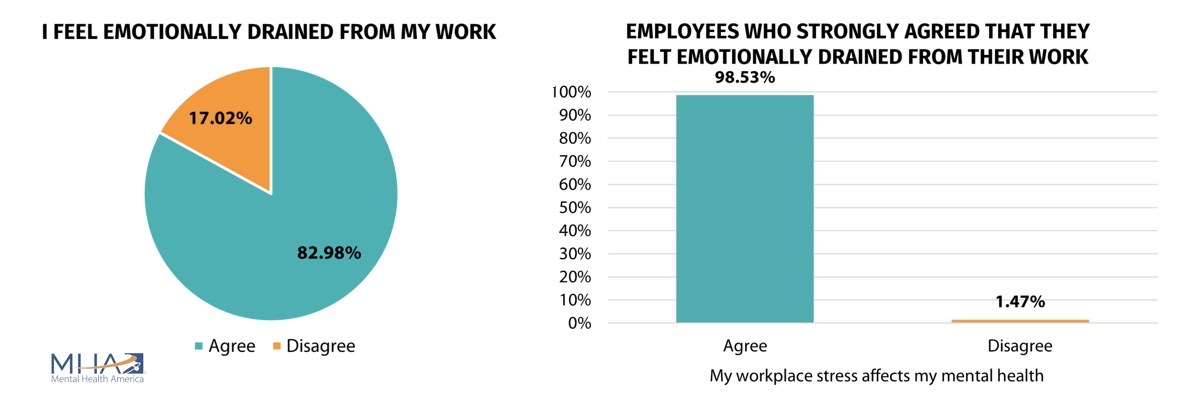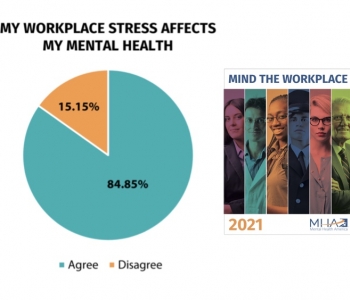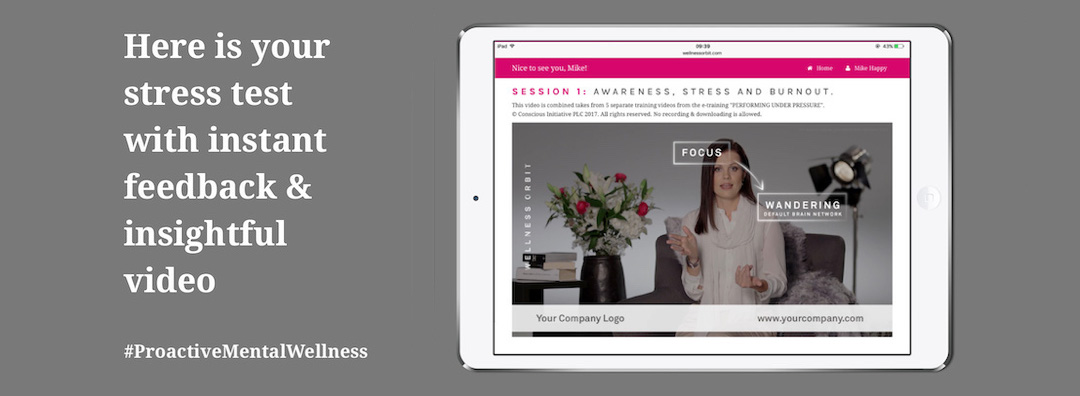Are you aware of how work stress influences you?
April is known as Stress Awareness Month. Are you aware of the negative effects of stress? What steps do you plan to take to prevent stress and burnout for yourself and your team?
In our previous blogs, we have written about work-related stress in the United Kingdom. Now MHA’s third annual Work Health Survey measured the perceptions of over 5,000 employees across 17 industries in the United States. Let's look at some of the stress and burnout data from this survey, as it shows the size of the problem.
BURNOUT RISK IS SKY HIGH
Before the data, let's clarify that burnout is a syndrome resulting from chronic workplace stress that hasn't been successfully managed.
According to the recent Work Health Survey, "Most employees are experiencing the early signs of burnout. Nearly 83% of respondents felt emotionally drained from their work, with over 40% stating they strongly agreed with this statement." It should alarm you as employee burnout is fully preventable by early proactive mental wellness measures that we have developed for you and your team.
The survey results also clearly state that "Employees who are experiencing exhaustion, an early sign of burnout, report that workplace stress was affecting their mental health."
Nearly 85% of respondents agreed (somewhat to strongly agreed) that their workplace stress affects their mental health (see the graph below). That should be a warning sign that something is broken in how most of us work.

WORK STRESS CAUSES EMPLOYEE BURNOUT
Out of all the employees who strongly agreed that they feel emotionally drained by their work, in total 99% somewhat agreed or strongly agreed that their workplace stress affects their mental health (see the graph above). Indeed, that is a subjective opinion, but what surprised us is that this number is even greater than any similar figure that we have seen before.
It shows that, in retrospect, most employees know what burned them out and got them mentally ill. And yes, that is stress!
However, knowing something afterward is very little help for you! You need to be coping with stress now, regardless of whether you work from home or the office, or any other location.
PREVENTING BURNOUT IS VITAL FOR KEEPING YOUR TALENT
Another study by the APA claimed a few years ago that burned-out employees are 2.6 times as likely to be actively seeking a different job, 63% more likely to take a sick day, and 23% more likely to visit the emergency room.
People who experience the final phase of burnout might never return to the workplace that got them unwell.
Does this wake your interest to keep your top talent with you? After all, burnout mostly affects top experts and other key players in your team.
Now, let's take a step back and ask what is the most common pathway to burnout? The answer is stress. And mostly, it is positive stress that initially can give people drive.
Let's go back to the basics and explain:
- What is stress?
- What are stress symptoms?
- What is the stressor?
WHAT IS THE DEFINITION OF STRESS?
Stress is easiest to define as your own adverse inner reaction that you experience when you face excessive external pressures that you fail to handle within your mind.
In that sense, the causes of stress aren't out there, as is a popular myth. Instead, efficient stress management should start from within your own mind by reducing your inner reactivity to external stressors. When you respond with awareness, you won't be imprisoned by stressors and can remain inwardly calm and focused on what you do.
Before moving on, let's clarify that positive stress or eustress means a situation that you perceive as a stressful situation as an opportunity. It is the type of stress response that you feel when you get excited. For example, something you feel at your wedding or after being signed up for an interesting project. The thrill and eagerness that come along with such stress are why it is often praised.
On the other hand, negative stress or distress is a type of stress that results from being overwhelmed by demands, losses, or perceived threats.
If continuous, stress can lead to loss of productivity and work engagement, exhaustion, burnout, depression, and many other health problems.
WHAT ARE THE STRESS SYMPTOMS?
How do I know that I am stressed?
There are both psychological and physical stress symptoms.
Psychological symptoms of stress can include:
- Sleep troubles and difficulty relaxing and switching off;
- Lack of focus and difficulty concentrating;
- Lack of self-confidence and postponing decision-making;
- Irritability and anger;
- Sadness and tiredness.
Physical stress symptoms can be:
- Muscle tensions and spasms;
- Headaches and pain (neck, shoulder, and back pain are the most common);
- Low energy levels and changes in appetite;
- Shortness of breath or difficulty breathing.
If you aren't sure of your actual stress level, then please take a free stress test that clicks below.
The outside pressure, condition, or stimulus is called a stressor.
Stressors can come from many different areas, such as work, human relations, economic and financial situations, lockdowns, restrictions to personal freedom, etc. While you can do relatively little about the pandemic or central banks' frightening financial policy that focuses on currency printing as a solution to everything, you can change the different reactions that such stressors trigger within your own mind.
Everyone doesn't experience external stressors the same way. What can be a problem for one person can be an opportunity for the other.

THE SOURCE OF STRESS IS YOUR INNER REACTIVITY
Too much focus on stress reduction has been on the removal of external factors. However, that isn't a solution as such. First of all, you can't control things around you, and second, a new situation or location will always present fresh stressors. The external conditions also matter (and we are firmly pro great work environments), however, intrapersonal factors just matter even more.
Let's assume that you worked from home. Did you get rid of all the stress? Or let's assume that, as you worked in the area where demand spiked and you got an income rise, did it take away your stress? Or you got a new desk with a lovely view, did it make you less stressed? Or did those events add stress or just bring along a bit of different stress?
To simplify, when you come into contact with too much outside pressure, your own inadequate inner reactions cause you emotional and mental overload. Failure to deal with this intrapersonal or inner overload is your stress.
Why do you fail to deal with stress?
Not because of the central bank's inadequate currency policies or your employers' or your shareholders' decisions. Those might have been bad, but how you felt and thought about those decisions is what kept you trapped.
Your inability to deal with your inner reactions is the main cause of your stress. Pause and watch this video.
HOW GOOD AM I AT STRESS MANAGEMENT?
Ask yourself a few simple questions:
- Do I know how to manage stressful situations?
- When I face a stressful situation, does it trigger any inner reactions? What kind? Are those reactions often the same or similar?
- How much stress can I take before it affects my mental health and physical fitness?
- Is my motivation found in what I do, or is it based on unsustainable positive stress that gets me excited first and exhausted later?
- Am I able to spot the early warning signs of burnout? Do I have an action plan on how to prevent my burnout after I spotted such signs?
Please ask those questions, as it allows you to understand how much freedom and self-leadership skills you have.
WHERE SHOULD I START?
Each problematic situation can be seen as a problem or viewed instead as a challenge. It is your own mind that chooses the viewpoint or attitude. As John Milton wrote so well in his poem 'Paradise Lost':
“The mind is its own place, and in itself can make a heaven of hell, a hell of heaven.”
So, the question is, who decides what is going on within your mind? You? Or your colleagues, your boss, your government, your chosen TV programs, your friends, overnight sensational influencers in Social Media that come and go faster than you can count?
When you react to everything you hear, the external world influences your decisions heavily, and you seem to have no say in it. But is this the reality?
The fact is, others can control you only until you don't understand how your mind works and functions.
CHANGE IN PERCEPTION
What if you just observed the world with inner calmness? What if you could always keep a calm mind when at work? What if nothing no longer irritates you, and you can choose what goes on your mind?
Is it even possible?
We assure you it is! Everyone around you can improve their mental strength and inner calmness.
When you learn how to observe with a calm mind and replace your own inner automatic reactions with adequate responses, you will gain much more freedom. Such freedom comes from learning practical intrapersonal skills. This freedom frees up your potential to focus, take initiative, and get things done.
FREEDOM ORIGINATES FROM INTRAPERSONAL SKILLS
Until you lack practical and applicable intrapersonal skills, stressors will influence you and create overwhelming situations for you. Experiencing such pressures and situations by reacting to them constantly restricts you from focusing on your work tasks efficiently. Sooner or later, it makes you face severe physical and mental health problems.
The problem with stress is that it builds slowly. The same problem also comes with burnout. Burnout never happens overnight.
The problem is that stress becomes chronic and then turns into several phases of burnout so slowly that you will get used to the added levels of stress and the heavy burden of burnout that builds over time.

YOU CAN REVERSE THE PHYSIOLOGICAL EFFECTS OF STRESS
What matters is that stress and burnout aren't mental health conditions, however, both are the leading causes of many mental health-related issues that escalate into severe mental illnesses as well as physical health problems. That is why the early proactive approach is more effective than prevention in later phases.
When you have a long habitual pattern from a lifestyle that leads to ruin, it is difficult to change. However, when you are mentally or physically ill, it demands treatment. For example, treating mental illnesses or cardiovascular diseases that originate from stress takes time, is costly, and still demands lifestyle changes. But, what if you made some small healthy choices now?
The effort you need to apply now, while you are, in general, quite well, is much smaller than the effort you need to use to get back healthy when you are ill.
As we pointed out, stress and burnout are the lifestyle choices of successful professionals and executives, or other business leaders or entrepreneurs. How you live is up to you. However, what if your lifestyle would add to your inner wellness, inner calmness, and allow you to stay focused on what you want and as long as you want? Would that be great?
YOU CAN'T REMOVE STRESSORS, BUT YOU CAN REDUCE YOUR STRESS
When you educate yourself and enquire how your inner domain is built, you may find that some basic rules apply. You can find out that you can choose how you feel, what you think, and upon what you choose to focus on.
When you obtain excellent intrapersonal skills, you too can handle any external turmoil with inner peace and use aware decision-making for the benefit of yourself, your team, your work, and your personal life.
As the MHA’s third annual Work Health Survey pointed out, "Nearly 1 in 4 employees experienced the more severe signs of burnout, including reduced professional efficacy and cynicism towards coworkers and their jobs." This survey showed that over 23% of employees reported that they don’t care what happens to their colleagues or clients.
But what if you are this colleague? Or this customer? Would you stay or vote with your feet? And here is one more reason why you need to address stress reduction ASAP.
The Wellness Orbit e-training 'Performing Under Pressure' allows you to learn more about stress and burnout prevention.
Once you and your colleagues can understand how stress develops and can spot the early warning signs of burnout, you can avoid pitfalls for you, your team, and your customers.
CONCLUSION – START WITH STRESS REDUCTION NOW!
What you should take with you as the most important fact is that stress reduction is the most efficient method of preventing burnout and work-related mental health issues.
It is the unique proactive mental wellness approach that distinguishes Wellness Orbit from others. On this webpage, you will find a systematic intrapersonal education that allows you and your team to remove the stress and burnout problem at fair prices. When applied, practical intrapersonal skills can bring along excellent ROI.
I really couldn't imagine thriving and living a vital life without the skills Wellness Orbit teaches. I love my life, and I hope that you will find a life that you love. That is why I recently shared my own mental wellness story. When you are well, you can do meaningful work that is for the service of others.
This blog post is by Kaur Lass. Updated 12.09.2025




